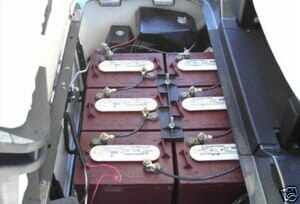Golf Cart Battery Disposal
Golf Cart Lead Acid Batteries are classified as hazardous waste.
Ensure that you dispose of them properly
Lead acid batteries have been determined to be unsuitable for disposal as municipal solid waste because they contain toxic heavy metals and have corrosive properties.
 Golf cart batteries are not to be placed in waste baskets or dumpsters where they will end up as municipal trash.
Golf cart batteries are not to be placed in waste baskets or dumpsters where they will end up as municipal trash.
So, what can you do with golf cart battery disposal?
For starters, don’t toss your golf cart’s old battery into a bin with your household recyclables and leave it on the curb.
The battery, also referred to as a lead-acid battery, contains about 21 pounds of lead, three pounds of plastic, and one gallon of sulfuric acid. These items can be toxic if handled improperly.
If you are the do-it-yourself type, take your spent battery to a quality auto parts retailer that is committed to battery recycling.
Nearly 90 percent of all lead-acid batteries are recycled. Almost any retailer that sells lead-acid batteries collects used batteries for recycling, as required by most state laws.
Reclaimers crush batteries into nickel-sized pieces and separate the plastic components. They send the plastic to a re-processor for manufacture into new plastic products and deliver purified lead to battery manufacturers and other industries.
Many states have regulations in place requiring battery recycling. (Thirty-seven states in the U.S. require lead-acid battery recycling; making retailers collect used lead-acid batteries from customers who buy new batteries.)
As neither sulphuric acid nor lead are exactly good for the environment you have to be careful when you dispose of old lead-acid batteries. Leave it for recycling. You can also leave your old battery where you buy your new one. If that should not be the case, contact your local municipality to check where you can safely dispose of old batteries. In the old days, when we changed a battery, we threw out the old one and never gave it a second thought. Today, we know better. We know that:
· Individuals who become poisoned by lead can experience symptoms including irritability, stomach aches, poor appetite, diarrhea, colic, distractibility, and lethargy;
· Lead acid typically consists of 40% sulfuric acid, a corrosive that can burn skin; and
· The improper disposal of lead-acid batteries can contaminate soil and water. The toxic metal is not able to dissolve in water or biodegrade, dissipate, decay, or burn, making it an extremely harmful hazard.
On a positive note it seems as if most people take this seriously. About 93% of all battery lead is recycled, making it the most highly recycled consumer product. Help in making sure we go towards 100%!
For additional information on golf cart batteries including how lead acid batteries work; how to use a hydrometer; how to change batteries and how troubleshoot golf cart batteries, please visit the: Golf Cart Batteries Guide

